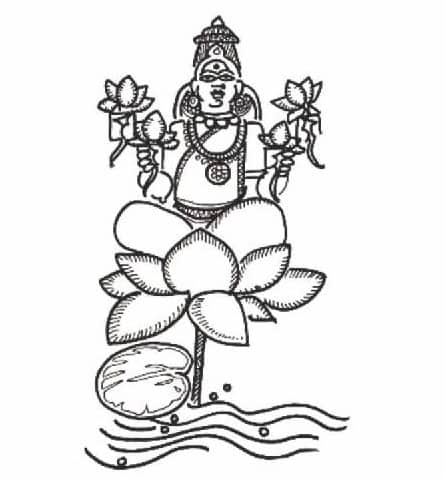試す 金 - 無料
Deliberations with Devdutt
Yoga and Total Health
|November 2020
Playing Cards to Win Whimsical Lakshmi

The word ‘Lakshmi’ comes from the word ‘Laksh’ which means target. Inanimate objects don’t have targets: a rock has no target, the river has no target, clouds have no target, but all living creatures do have a target. All living creatures look for food; if they don’t get it, they will die. So, they have a target called food. Food, their Laksh, becomes their Lakshmi. When they consume food, they stay alive. For plants, Lakshmi is sunlight, water, nutrients.
For herbivorous animals, Lakshmi is grass and leaves. For carnivorous animals, it is the flesh of other animals. Basically, Lakshmi is the currency that sustains nature.
For humans, Lakshmi is not just food, it is also property. It is the clothes we wear, the house we live in, the products we consume. So, the more Lakshmi we have, the more comfortable our life becomes. So the concept of Lakshmi widens in the human world.
The ancient Vedic seers understood this long ago. They composed a song praising Lakshmi called the Shri Sukta, which is found in the Rigveda.
このストーリーは、Yoga and Total Health の November 2020 版からのものです。
Magzter GOLD を購読すると、厳選された何千ものプレミアム記事や、10,000 以上の雑誌や新聞にアクセスできます。
すでに購読者ですか? サインイン
Yoga and Total Health からのその他のストーリー

Yoga and Total Health
Change - The Universal Constant
How to navigate it successfully
3 mins
January 2026

Yoga and Total Health
Nishkama Karmayoga in the Bhagavad Gita
Action without self-interest - Part 6
2 mins
January 2026
Yoga and Total Health
A Temple for A Dog
Of debts and Dharma
2 mins
January 2026

Yoga and Total Health
Key Concepts: Therapeutic Yoga Yoga Psychology for Everyone
From healing oneself to healing others
4 mins
January 2026
Yoga and Total Health
Niyamas
Observances for self-development
2 mins
January 2026

Yoga and Total Health
Guduchi / Giloy
This month we have a recipe using Guduchi powder.
1 min
January 2026

Yoga and Total Health
The Exploiters of Nature
Pitfalls of the minus mind
6 mins
January 2026

Yoga and Total Health
Getting on to the Starting Line
Finishing something requires that first push
4 mins
January 2026

Yoga and Total Health
The Happy Place
From outside to inside
4 mins
January 2026

Yoga and Total Health
Money Makes the World Go Round
But you can't buy happiness
2 mins
January 2026
Translate
Change font size
